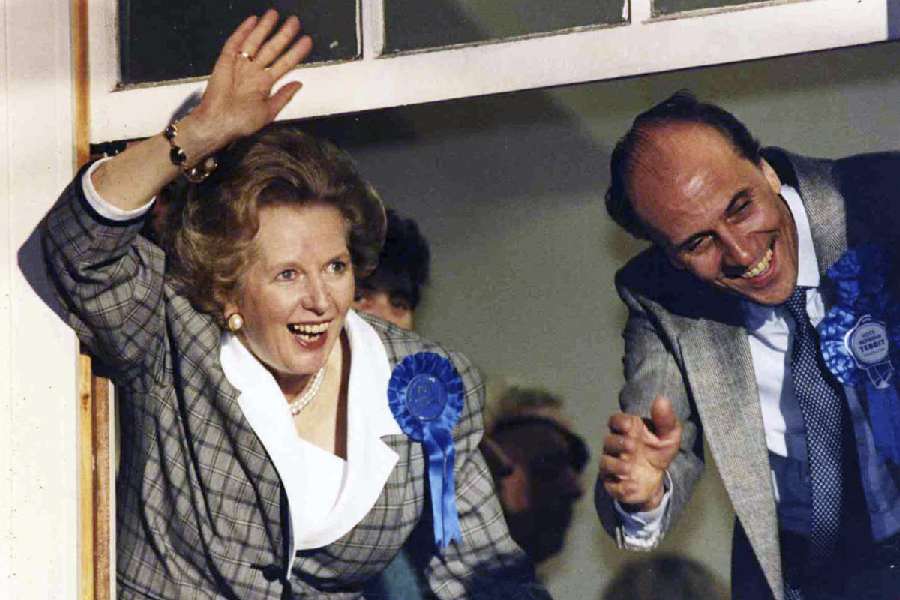Norman Tebbit, an uncompromising Right-wing British politician who was once considered to be a potential Prime Minister, died on Monday. He was 94.
His son William said in a statement to the BBC that Tebbit had “died peacefully at home”. He did not give a cause of death.
Tebbit, a member of Parliament from 1970 to 1992, was a leading figure in Margaret Thatcher’s government but abandoned high office to tend to his wife after she was mostly paralysed in a hotel bombing by the Irish Republican Army, in which he was also badly hurt.
Michael Dobbs, an author, former close aide to Tebbit and fellow member of the House of Lords, told the BBC he had confirmed the death with the family. “Norman has been frail — or was frail — for quite some time, and sadly it’s almost a relief for his wonderful family and for Norman himself,” he said.
Well into his 80s, Lord Tebbit — ennobled as a baron in 1992 — retained the ability to project himself into the public eye, both as a blogger and from the red leather benches of the House of Lords, Britain’s unelected upper house of Parliament.
From both platforms, he sniped at his opponents and at members of his own party who did not share his uncompromising views. He resigned from the Lords in 2022.
In the 1980s, as a minister and, initially, a close ally of Thatcher, he took a lead in her campaign to crush the power of labour unions.
He “personified the cruel, uncaring side of Thatcherism”, the columnist William Leith wrote in The Independent in 1993. “He was the man who seemed to have no sympathy for slackers, but every sympathy for a rather vulgar kind of nationalism.”
When Britain faced riots ascribed by some to unemployment, Tebbit remarked caustically that his own father had been jobless in the 1930s but that he “did not riot”.
Tebbit was famed for suggesting the unemployed should get on their bikes to look for work, and for what became known as Tebbit’s “cricket test” — his 1990 assertion that immigrants could not truly be British until they cheered for England at cricket, rather than India, Pakistan or the West Indies.
In his 1988 autobiography, Upwardly Mobile, Tebbit described his trade union legislation, enacted in 1982, as “my greatest achievement in government” and called it “one of the principal pillars on which the Thatcher economic reforms have been built”.
Defying proponents of multiculturalism, he drew clear distinctions between what he termed his island “tribe” and outsiders.
Norman Beresford Tebbit was born on March 29, 1931, in Enfield, north London, the son of Leonard and Edith Tebbit. His father was a pawnbroker and jewellery shop manager who later unsuccessfully ran a pub and worked as a house painter.
His modest, “drab and grey” origins gave him a particular affinity with ordinary voters, Tebbit said.
He had a long spell as a pilot at the British Overseas Airways Corporation, the state-owned long distance carrier which was a precursor to British Airways. He married Margaret Elizabeth Daines, who had worked as a nurse, in 1956. They had three children: Alison, John and William.
Current Conservative Party leader Kemi Badenoch said Tebbit was “an icon in British politics”.
“He was one of the leading exponents of the philosophy we now know as Thatcherism and his unstinting service in the pursuit of improving our country should be held up as an inspiration to all Conservatives,” she said. “He never buckled under pressure and he never compromised.”
A political bruiser known for no-holds-barred attacks on the opposition, Tebbit was nicknamed the “Chingford skinhead” by opponents.
Michael Foot, who led the Labour Party in the 1980s, called him a “semi-house-trained polecat”.
However, even Tebbit’s critics praised his stoic response to the Irish Republican Army bombing of Brighton’s Grand Hotel during the Conservative Party conference in 1984. Five people were killed in the bombing, an attempt to kill Thatcher. Tebbit was seriously wounded and his wife Margaret was paralysed from the neck down.
He continued to speak out, especially on Britain’s increasingly close relationship with Europe, about which he was sceptical. He was a prominent advocate of Britain’s departure from the EU, an issue that divided his party and the country.
After a 1998 peace accord ended three decades of violence in Northern Ireland, many former militants entered politics, But Tebbit did not forgive. When the former IRA commander Martin McGuinness — who had become deputy first minister of Northern Ireland — died in 2017, Tebbit expressed hope he was “parked in a particularly hot and unpleasant corner of hell for the rest of eternity”.
New York Times News Service and AP










